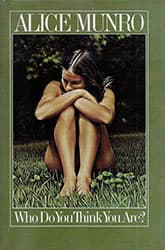The Beggar Maid
Critique • Quotes
 Collection, first edition
Collection, first editionFirst publication in book
1978 in Who Do You Think You Are?
Literature form
Story
Genres
Literary
Writing language
English
Author's country
Canada
Length
Approx. 12,000 words
The long and short of a woman's story
"The Beggar Maid" is one of Alice Munro's novelistic stories. Not that it is overly long—a little longer than the average modern story perhaps, though well short of longer literary forms.
But after reading it, you might feel you've taken in at least a novella's worth of narrative—like a novel without all the padding. If you've often found yourself bogging down partway through a book and you want to shout at the author, "Just get to the heart of it, please!"—and I admit this happens a lot with me—then this is the kind of story you might especially appreciate.
Some commentators don't even call this piece a short story, but rather consider it a chapter in a longer novel. The book that includes "The Beggar Maid" was published in Canada as Who Do You Think You Are? and elsewhere as The Beggar Maid: Stories of Flo and Rose. This section, like each of the others, deals with episodes from the life of Rose, from young girl to mature woman in smalltown and big-city Ontario, and her stepmother Flo.
But this approach of treating the book as a novel misses that each of the pieces, though linked by characters to the rest, stands on its own. You can pick up the book to read any one of them separately and put it down afterwards feeling you've had a complete literary experience.
Or you can read a few of them together to get an enriched experience. Munro's own Selected Stories of 1996, for example, reprints four stories from Who Do You Think You Are? to read in sequence: "Royal Beatings", "Wild Swans", "The Beggar Maid" and "Simon's Luck".
Even on its own, "The Beggar Maid" covers several periods in Rose's life, specifically in regard to her relationship with Patrick, an affluent young man who bewilders her by falling in love with her at college and giving up his own dreams to provide her the life he thinks she wants.
Something larger
The story's title comes from an old English ballad about a somewhat asexual king who falls for a beggar girl and makes her his queen—after which they live happily ever after. Reference is made to a famous painting depicting the couple.
In Munro's story, we get the perspective of the "beggar" in the rags-to-riches tale. Her feelings toward Patrick are quite complex. Not even Rose understands her shifting attitudes that play out over their ten-year-marriage and nine years of divorce.
If we've read previous chapters from Rose's life, we might feel we understand her better because we know some of what she's gone through. But this is too easy.
At one point in this chapter, when Rose unexpectedly rejects Patrick, he questions whether she is sick, is about to have her period or has been unduly influenced by her spinster mentor at college. We know these explanations are bogus but we fare little better by digging up explanations from incidents in Rose's past.
Munro in this particular story is getting at something more than a woman being conflicted because of an oppressive upbringing or because she was groped by a minister on a train when she was a girl. Those details may come into it, but Munro is onto something larger about relations between the sexes in this world.
What exactly that is can be difficult to put into words, except through fiction, through the relating of a story such as this. That's the long and short of it.
— Eric
Critique • Quotes

